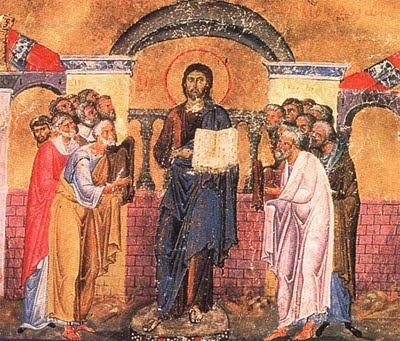
In the 61st chapter of Isaiah, there is a beautiful prophecy of the Lord's advent, and of the impact that it would have. It begins this way:
“The Spirit of the Lord God is upon Me, Because the Lord has anointed Me To preach good tidings to the poor; He has sent Me to heal the brokenhearted.... (Isaiah 61:1)
In the New Testament, in Luke 4:14-22, we see confirmation of this prophecy, in this story:
"14 And Jesus returned in the power of the Spirit into Galilee: and there went out a fame of him through all the region round about.
15 And he taught in their synagogues, being glorified of all.
16 And he came to Nazareth, where he had been brought up: and, as his custom was, he went into the synagogue on the sabbath day, and stood up for to read.
17 And there was delivered unto him the book of the prophet Esaias. And when he had opened the book, he found the place where it was written,
18 The Spirit of the Lord is upon me, because he hath anointed me to preach the gospel to the poor; he hath sent me to heal the brokenhearted, to preach deliverance to the captives, and recovering of sight to the blind, to set at liberty them that are bruised,
19 To preach the acceptable year of the Lord.
20 And he closed the book, and he gave it again to the minister, and sat down. And the eyes of all them that were in the synagogue were fastened on him.
21 And he began to say unto them, This day is this scripture fulfilled in your ears.
22 And all bare him witness, and wondered at the gracious words which proceeded out of his mouth. And they said, Is not this Joseph's son?"
In this passage, who are the poor, and the brokenhearted? They are people who do not yet know enough real truth, or who therefore are not yet able to receive real good. They are people who "are ignorant of truth and who desire it." (Inner Meaning of the Prophets and Psalms 61).
Here's another source:
"These things (above) are said of the Lord. 'The poor' to whom Jehovah has anointed Him to preach good tidings, refers to those who are in few truths, and yet desire truths that their soul may be sustained by them. The 'broken in heart' stand for those who as a consequence are in grief." (Apocalypse Explained 811[17]).
Every person has two spiritual faculties that work together -- a will (the things we love), and an understanding (the things we know and believe in). We're born with both, and they gradually develop. Our original will is mostly selfish, and it needs to be gradually expunged, and replaced by a new unselfish will that the Lord wants to implant and develop in us. On our personal spiritual journeys, that's the the big thing that needs to happen.
Our understanding, at some points in that process, needs to step out ahead of the will, and learn true ideas, and construct them into a framework. There has to be a part of the will that directs the understanding to make this effort, and wants to use the framework. There's another part of the will that says -- no, not interested, don't bother, maybe later. But it's the unselfish part - the good part - that feels this driving need for truth. It's people who are in this state that are poor (needing to learn truth), and brokenhearted (in grief, and therefore wanting to learn truth, so that they can be good, and receive the Lord's love). See Arcana Coelestia 6854[3] and its related cross-references for an interesting discussion of this process.







